Academic studies are one thing—but how is Vanderbilt promoting sustainability in its own operations? Perhaps most visibly with a new solar-powered electric-vehicle charging station on 21st Avenue, a compost pile on Wedgewood Avenue, and nearly a dozen gorgeous, LEED-certified green buildings. Here are a few others you might not notice on a campus visit, but which make a big difference:
Centrally controlled irrigation system
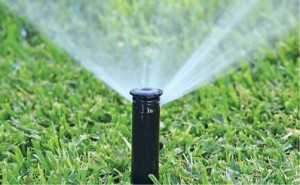 Vanderbilt is transitioning to a centrally controlled irrigation system across campus. The system allows grounds staff to manage water use from a central computer for quick, water-saving adjustments to changing conditions—like rain. The system is currently implemented on The Martha Rivers Ingram Commons and will be rolling out across the rest of campus during the next two or three years.
Vanderbilt is transitioning to a centrally controlled irrigation system across campus. The system allows grounds staff to manage water use from a central computer for quick, water-saving adjustments to changing conditions—like rain. The system is currently implemented on The Martha Rivers Ingram Commons and will be rolling out across the rest of campus during the next two or three years.
Maintenance trikes
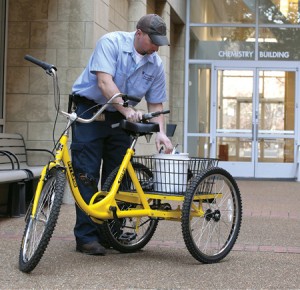
Plant Operations has purchased four heavy-duty gold tricycles to replace pickup trucks and golf carts currently used to transport staff and their tools around campus. At $1,000 apiece, the trikes paid for themselves almost immediately in gas, maintenance and insurance savings. They’re a hit with the crew, too—they allow workers to park closer to many of the buildings they serve than they could in a truck, and as many already know, it’s often faster to bike across campus than drive.
Flower power
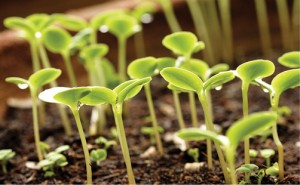 Two-thirds of the summer annuals beautifying Vanderbilt’s campus are grown from plugs by Vanderbilt horticulturist Laura Barker and Greenhouse Manager Jonathan Ertelt, MEd’99, in greenhouses on the Peabody campus and in the Stevenson Center. The flowers are grown in biodegradable peat pots for zero-waste planting.
Two-thirds of the summer annuals beautifying Vanderbilt’s campus are grown from plugs by Vanderbilt horticulturist Laura Barker and Greenhouse Manager Jonathan Ertelt, MEd’99, in greenhouses on the Peabody campus and in the Stevenson Center. The flowers are grown in biodegradable peat pots for zero-waste planting.
Perennial recycling
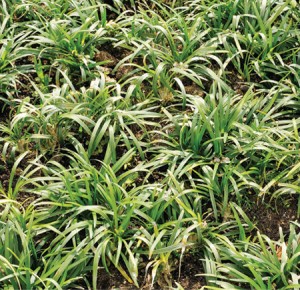
Vanderbilt doesn’t just recycle trash—it recycles plants. Instead of disposing of overgrown perennial groundcover like monkey grass, the grounds crew takes plugs of it and transplants it to other beds around campus. The transplantation project has covered 21,780 square feet.
Tea, anyone?
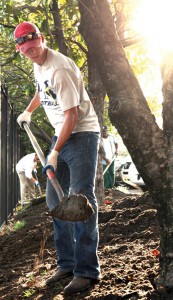 Vanderbilt has been composting for more than a year—collecting organic debris from around campus and letting it decompose into a nutrient-rich fertilizer replacement. Now the grounds crew is taking compost to the next level by cooking it in barrels with molasses, seaweed and organic soil conditioner for 24 hours. The result is an incredibly nutritious fluid that can be sprayed on older plant beds and trees to help supercharge the soil around them.
Vanderbilt has been composting for more than a year—collecting organic debris from around campus and letting it decompose into a nutrient-rich fertilizer replacement. Now the grounds crew is taking compost to the next level by cooking it in barrels with molasses, seaweed and organic soil conditioner for 24 hours. The result is an incredibly nutritious fluid that can be sprayed on older plant beds and trees to help supercharge the soil around them.
—LIZ ENTMAN